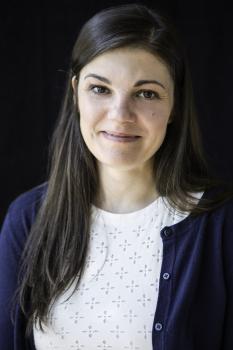Common Read Author Land Shines Light on Working Class Struggle

By Katherine Haines ’21
At the spring Common Read event on March 3, Stephanie Land, author of Maid: Hard Work, Low Pay, and a Mother’s Will to Survive, laid bare the stereotypes surrounding people in poverty.
At an afternoon student Q&A session moderated by Dr. Jonathan Shandell, associate professor of Theatre Arts, Land talked about her writing process and her experience adapting her book for a Netflix series. The evening event, moderated by Julisa Linton ’21 and Jillian Knab ’22, focused on the struggles that Land highlights in her book.
“Her book chronicles her harrowing experiences as a single mom fighting against homelessness and trying to make ends meet in an economic system that has been rigged against her—and against all odds she succeeded,” said Knab.
Prior to the book’s publication, Land worked as a house cleaner and a freelance writer, which brought an “invisibility” that she found comfortable. She has spoken on the continued difficulties of shifting to a public role, and recognizes that the themes in her book help to fuel conversations about poverty and the narratives surrounding the discussion of poverty.
“I had written about a job where I was paid very little to not leave any footprints, and now I had the opportunity to write a book where people could walk around in my shoes,” said Land. “My book started this movement toward empathy and compassion and the greater good; it gave me some purpose.
One reason her book received so much attention was because of the way Land examined the idea of “blame” and its impact both on those in poverty and those who are not, such as the misguided perception of people in poverty being responsible for their own circumstances. Land also recognizes that there is another level to the blame narrative, which is the fear of how easy it would be for those not in poverty to be in a similar position, and their need to convince themselves that their “right” choices meant poverty would never be a reality for them.
“I think people get just so overwhelmed by the whole situation that we have created a character of a person in poverty, and it is not usually someone that looks like it,” said Land. “It is usually a person of color or someone who has very obviously experienced systemic poverty, and those are the characters that we think of when we think of who is on food stamps, who is needing government assistance. We don’t think that it could be your neighbor across the street who just lost their job, and their house is about to be in foreclosure, and they probably need food stamps.
“Even as we are realizing how much racism is affecting poverty and how much poverty is fueled by racism, we still need to know what we’re going to do,” said Land. “It’s frustrating and it’s hard, and I think that dismantling racism is really a huge part of that. The more we realize how much we need to do, the more that the other systems might actually change.”
Arcadia University selects one or two books each academic year for their ability to generate critical conversations about social justice in the United States and across campus, and designates them as the year’s Common Read books. Last semester’s Common Read was How to Be an Antiracist by Ibram X. Kendi.


